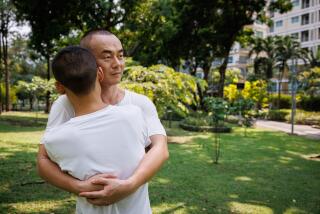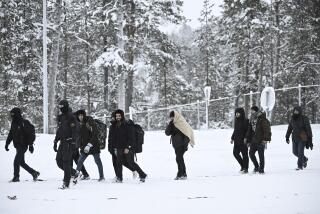
- Share via
PHUKET, Thailand — For many years, Chinese tourism fueled the economy of this island paradise, known for its tropical weather, stunning sunsets and foreign-friendly accommodations.
But with Russia’s full-scale invasion of Ukraine three years ago, Thailand’s Phuket Island is transforming into a different kind of getaway: a refuge for Russians fleeing military conscription, political oppression and the economic impact of Western sanctions.
Businesses in Phuket — many still recovering from the pandemic — have responded quickly and enthusiastically.
Restaurants now serve sweet porridge. Grocery stores sell sauerkraut, borscht and blinis with cottage cheese. Gyms offer ice baths and saunas, while Russian-language signs have popped up around busy parts of town. One entertainment lounge that opened two years ago advertises trivia nights, movie showings and live performers — all in Russian.
Phuket is becoming “Little Moscow,” jokes Boon Yongsakul, vice president of the Phuket Real Estate Assn.
Some of the island’s attractions, such as international schools and long-term visa options, have long been a draw for foreigners. But as Western sanctions have made bank transactions and travel through Europe more difficult for Russians, Phuket’s cash-friendly real estate market and direct flights from the Middle East have enhanced its appeal.
As of 2022, Russia has been the largest source of foreign arrivals in Phuket, according to data from the Phuket Tourist Police. Since then, the number of visitors has quadrupled to 1.03 million annually.
Hungry for more tourists, Thailand has encouraged the trend to continue. The Tourism Authority of Thailand aims to attract 2.2 million Russian tourists this year, up from about 1.7 million in 2024. In 2023, Moscow opened a consulate in Phuket to serve the growing number of Russian nationals.
“As more and more people realize it’s safe here, the communities get bigger,” Yongsakul said. “They have their own churches, their own businesses, their own food.”
Bogdan Martianov, a 25-year-old tech worker from St. Petersburg, Russia, wanted to avoid being drafted to fight in the Ukraine war. So he flew to Argentina and sought political asylum. For two years, he lived and worked in La Plata, an hour’s drive from Buenos Aires.
In November, uneasy about the economic impact of the austerity measures under new Argentine President Javier Milei, he flew to Phuket to join some friends who had fled Russia as well.
Martianov initially planned for a two-month trip. But the ease of life and existing Russian community have convinced him to stay at least through spring.
“This is like a preferred zone where we can meet together,” he said. “That’s why I’m here and why I want to stay here.”
Many of the newly arrived Russians have gathered on the west side near Bang Tao Beach, where Yongsakul owns several luxury properties.
He estimates that condominium prices have nearly doubled since 2020, while land prices have risen by about 50%, in part because of demand from Russian buyers.
Bill Barnett, managing director at C9 Hotelworks, a hospitality and real estate consulting firm in Phuket, said Russian tourists started visiting in larger numbers 10 years ago, as improving economic conditions gave them more spending power. The warm climate was a welcome change from winter in Eastern Europe.
Thailand also makes it easy for foreigners to buy property, Barnett said, a boon for Russians looking for a place to park their cash. “Phuket real estate has become the bank for Russian investors,” he said.
Their arrival has provided a much-needed boost to the island’s tourism-dependent economy. However, it’s also sparked controversy among locals wary of how Russian transplants are reshaping tourism and everyday life in Phuket.
“This is a positive thing for real estate, but not for the whole community,” Yongsakul said.
Thinakorn Jommoung, president of the Patong Public Transport Assn., said Russians, just as Chinese visitors did before them, are setting up their own tourism agencies and businesses, cutting Thai people like him out.
Despite the increase in travelers, Jommoung said, his income has remained more or less the same.
“They bring lots of money in, but the money does not go to people like me. In the end, all the money is going back home to Russia, or China, or Korea,” Jommoung said. “Small entrepreneurs are dying, one by one, because they cannot get any customers.”
He said even though the number of tourists is now rising, bookings among the 25,000 local drivers he represents have declined by about a third when compared with business before the pandemic.
He also worries Russians are skirting laws meant to protect local employment, such as those banning non-Thai citizens from being tour guides or majority owners in private businesses.
Krit Thepbumrung, president of the Andaman Tour Guides Assn., said that five years ago most of the hundreds of unlicensed tour guides in Phuket were Chinese.
Today most are Russian, said Thepbumrung, who leads a volunteer task force for the police department to track down illegal tour guides.
Thepbumrung said he’s also gotten more reports of Russians overstaying their visas, but it’s impossible to estimate the scope of the issue.
Meanwhile, government funding for the local police to address these issues, along with strains on traffic, garbage disposal and other infrastructure, neglects to take into account all the foreign arrivals, especially those staying past their visa allowance, he said.
Responding to resident complaints, police last year arrested dozens of Russians under suspicion of breaking business laws, Radio Free Asia reported. Other local media reports of Russians engaging in scams or robberies have bolstered concerns of misconduct among recent arrivals.
Perhaps not surprisingly, the migration of Russians — and resulting culture clash — has fueled a backlash among many locals, who welcome the visitors but worry about losing jobs and quality of life.
“Before, Phuket was not as messy as this,” Thepbumrung said. “I do not want to say we do not want them. But we want good-quality [tourists]. It must be balanced.”
Phuket was the first place in Thailand to reopen in 2021 after the pandemic stymied international travel in much of the world.
Seeing the rapid growth of Russian tourists, Sergei Skorupa, 34, decided to open a motorcycle rental service in Phuket with his Thai partner two years ago.
Originally from Moscow, Skorupa moved to Phuket in 2021, lured by the sun, sea and a greater economic opportunity than he saw in Russia.
Aware that foreigner-run businesses have become a sensitive issue, Skorupa noted that his Thai girlfriend owns the majority of the business, in accordance with local laws. He said he hires only Thai workers, even though it has led to clashes in their working styles.
But he said he sees greater prospects in Thailand and plans to stay.
“In Russia, we live in the system of the government,” said Skorupa, who worked at a state-owned transportation company back home. “But here we have freedom. We can develop our own business. ... I feel safe here; that’s very important.”
More to Read
Sign up for Essential California
The most important California stories and recommendations in your inbox every morning.
You may occasionally receive promotional content from the Los Angeles Times.











